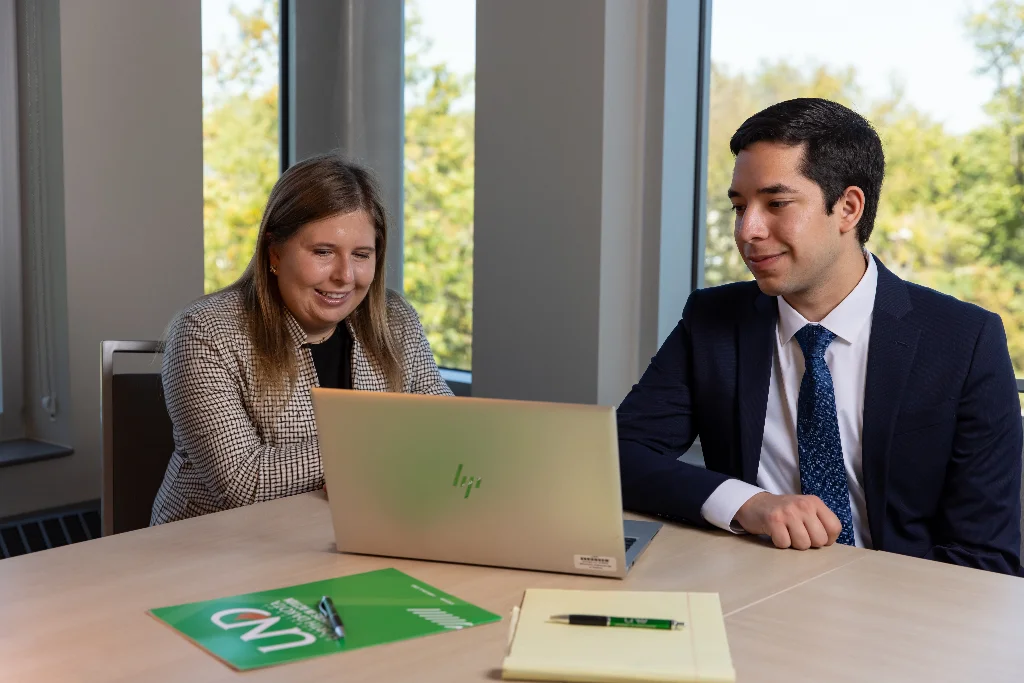
Types of Accounting Degrees
Accounting has evolved into an essential tool for understanding and improving business performance.
Request Information
Accounting, often likened to the language of business, serves as a scorecard that presents how a business is performing. Originally developed to classify and record monetary transactions, the scope of accounting has significantly evolved beyond merely tracking numbers. Today, accounting answers critical questions about a business's performance, highlights areas needing attention, and aids decision-making by evaluating alternative solutions. Accountants have thus become indispensable, adapting their roles to various specialized branches within the broader profession, ensuring that financial information is accurate, reliable, timely, relevant, and easily understood.
Accounting encompasses various career paths, each requiring specific knowledge and skills tailored to different facets of the financial world. So read on as we explore the different types of accounting degrees at UND, which will help you identify the path that best aligns with your career aspirations and interests.
Levels of Accounting Degrees
In any field, the depth of your education can significantly influence your career trajectory. Similarly, various levels of accounting degrees cater to differing career goals, ranging from entry-level positions to advanced specialties within the field.
For those just starting out, an undergraduate degree might suffice for many roles; however, more specialized or high-level positions often require graduate degrees and specific certifications. Understanding the different educational levels—from certificates to doctoral degrees—can help you plan your academic and professional journey effectively, ensuring you meet the qualifications for your desired role in accounting.
Certificate
A certificate in accounting is ideal for individuals looking to enhance their accounting skills quickly, fulfill continuing education requirements, or gain specialized knowledge in areas like tax accounting or forensic accounting. These programs are typically short-term and focused, providing a concentrated burst of education on specific aspects of accounting.
Earning a certificate can be a strategic move for those looking to advance in their current roles or pivot to new areas within the accounting field without committing to a full degree program.
Associate Degree
An associate degree in accounting offers foundational training in the field, focusing on the essential principles of accounting alongside complementary subjects such as business law and finance. These two-year programs are designed to equip students with the practical skills needed to perform various finance department support roles, including bookkeeping, accounts receivable, and payroll processing.
Graduates of associate degree programs often find employment in small businesses or as part of larger finance teams, and many use the degree as a stepping stone toward pursuing a bachelor's degree in accounting or related fields.
Bachelor's Degree
A bachelor's degree in accounting is generally more thorough than an associate's degree, providing an in-depth field study. This program covers core accounting disciplines such as financial accounting, managerial accounting, auditing, and taxation, which are essential for any accounting professional.
Obtaining a bachelor's degree in accounting is often considered essential for those pursuing professional accounting careers. It prepares students for entry-level positions and provides the educational credits needed to sit for certification exams like the Certified Public Accountant (CPA), a significant credential for career advancement in the field.

Master's Degree
A master's degree in accounting then delves even deeper into advanced accounting practices and allows students to specialize in niche areas critical to contemporary business environments. Programs are designed to enhance expertise in specialized fields such as financial analysis, where students learn:
- To interpret and use financial data effectively.
- Compliance, which covers the complexities of regulations and legal requirements.
- Strategic planning, which integrates accounting with long-term business planning.
Master's programs are particularly valuable for professionals aiming to fulfill the hours required to qualify for the CPA exam in many states. This advanced degree broadens knowledge and skills as well as significantly boosts career trajectories, opening doors to senior management roles, higher salaries, and greater responsibilities within various sectors.
Ph.D.
Lastly, pursuing a Ph.D. in accounting is ideal for those interested in the field's theoretical foundations and who aspire to contribute to academic knowledge through rigorous research. This degree suits those who wish to enter academia, do high-level consulting, or perform extensive financial research within corporate think tanks or governmental bodies.
Doctoral programs in accounting require students to engage deeply with complex accounting theories and to conduct detailed research that can provide new insights into the field. Graduates are well-equipped for careers as university professors, professional researchers, and consultants, often influencing high-level accounting practices and policies.
Types of Accounting Degrees at UND
UND's outstanding accounting degree programs have significantly contributed to the high success rates of their graduates on the CPA exam—a benchmark for any accounting professional.
A testament to the caliber of education at UND is the remarkable achievement of alumna Zsofia Bárándi. Zsofia not only passed all four sections of the Uniform Certified Public Accountant Examination on her first attempt but did so with an impressive average score above 95.5, placing her among the elite 137 individuals in the United States to win the prestigious Elijah Watt Sells Award. Her success highlights the strength of UND's accountancy programs, where she completed her bachelor's and master's degrees. So, let's explore the accounting degrees available at UND.
Bachelor of Accountancy (B.Acc.)
The Bachelor of Accountancy (B.Acc.) program at UND combines theoretical knowledge with practical applications, ensuring graduates are well-equipped for the professional world. It is available both on-campus and online, providing flexibility to suit various student needs. It typically requires four years to complete, encompassing 120 credit hours of coursework.
Students are introduced to the core areas of accounting, which include auditing, financial reporting, taxation, and management accounting. Elective courses allow for specialization in areas such as information assurance, public accounting, and tax compliance, ensuring students can tailor their education to their career aspirations. The program also highlights experiential learning opportunities, such as the Volunteer Income Tax Assistance program and internships with top accounting firms and corporate finance departments.
Accelerated Accounting Degree (B.Acc./M.Acc.)
UND's Accelerated Accounting Degree program offers an exceptional pathway for students aiming for a fast track to both a Bachelor of Accountancy (B.Acc.) and a Master of Accountancy (M.Acc.) within an ambitious five-year timeframe. This program, available both on campus and online, is structured to provide comprehensive and intensive accounting education, combining foundational undergraduate coursework with advanced graduate-level studies in specialized areas.
The program requires a total of 138 credit hours and encompasses foundational courses such as Principles of Microeconomics, Principles of Macroeconomics, and Business and Economic Statistics, along with core accounting courses including Intermediate Accounting I and II, Cost Accounting, and Federal Taxation, as well as several electives.
As part of the M.Acc. program, students can choose to specialize in one of several areas:
- Data Analytics
- Tax Compliance and Planning
- Business Administration
- Information Systems and Controls

Managerial Finance & Accounting Degree (B.B.A.)
The Managerial Finance & Accounting B.B.A program merges the precise technical skills of accounting with the strategic insight of finance. This interdisciplinary approach equips students with the skills needed to become key players in corporate leadership teams.
This program is also offered both on campus and online and typically spans four years, requiring the completion of 120 credit hours. It integrates essential studies with specialized coursework in both finance and accounting, ensuring a well-rounded education that covers core business disciplines. Typical classes of this degree include Principles of Management, Operations Management, and Marketing Foundations, as well as other advanced Accounting and Finance courses like Intermediate Accounting I and II, Financial Management, and Investment Analysis.
Accountancy Master's: Professional Track for Accounting Majors (M.Acc.)
The Master of Accountancy: Professional Track (M.Acc.) at UND is also offered both on campus and online, providing flexibility to accommodate full-time students and working professionals who may prefer to pace their studies by taking one course at a time. This adaptability makes it possible to complete the program in approximately 20 months, though the timeframe can vary based on the student's schedule and course load.
The program requires the completion of 30 credit hours, focusing on advanced areas of accounting that are crucial for a successful career in the accounting field. The coursework is designed to help students deal with unstructured problems and complex decision-making through a curriculum that includes courses such as:
- Business Law for Accountants
- Advanced Financial Accounting
- Data Analytics in Accounting and Financial Reporting
- Tax Compliance and Planning
Accountancy Master's: Fundamentals for Non-Accounting Majors (M.Acc.)
The Master of Accountancy: Fundamentals for Non-Accounting Majors (M.Acc.) at UND is tailored specifically for individuals aiming to transition into the accounting field from other career paths. So, this program is ideal for those who do not have an undergraduate background in accounting but wish to establish a firm grounding in essential accounting principles and practices.
Designed with flexibility in mind, this program is delivered entirely online with three start dates each year, enabling students to begin their studies at a time that best fits their schedule. It can be completed in as few as 20 months, though students have the option to extend their studies by taking one course at a time.
Conclusion
All in all, at UND, students can choose from multiple degree programs tailored to different career paths within accounting, each designed to meet distinct professional standards and goals. All these programs are renowned for their quality, as evidenced by the extraordinary achievements of their alumni.
Bárándi, reflecting on her time at UND, praised the department for its "amazing" faculty, "awesome" job placement resources, strong connections with firms, and excellent scholarship opportunities. So, explore the accounting programs offered at UND and experience the supportive, resource-rich environment that helps each student thrive.
FAQs
A Bachelor's degree in accounting is typically essential for becoming an accountant, providing the necessary foundation for entry-level positions and CPA examination eligibility.
Completing a bachelor's degree in accounting typically takes four years of full-time study.
A two-year accounting degree is commonly referred to as an Associate Degree in Accounting.